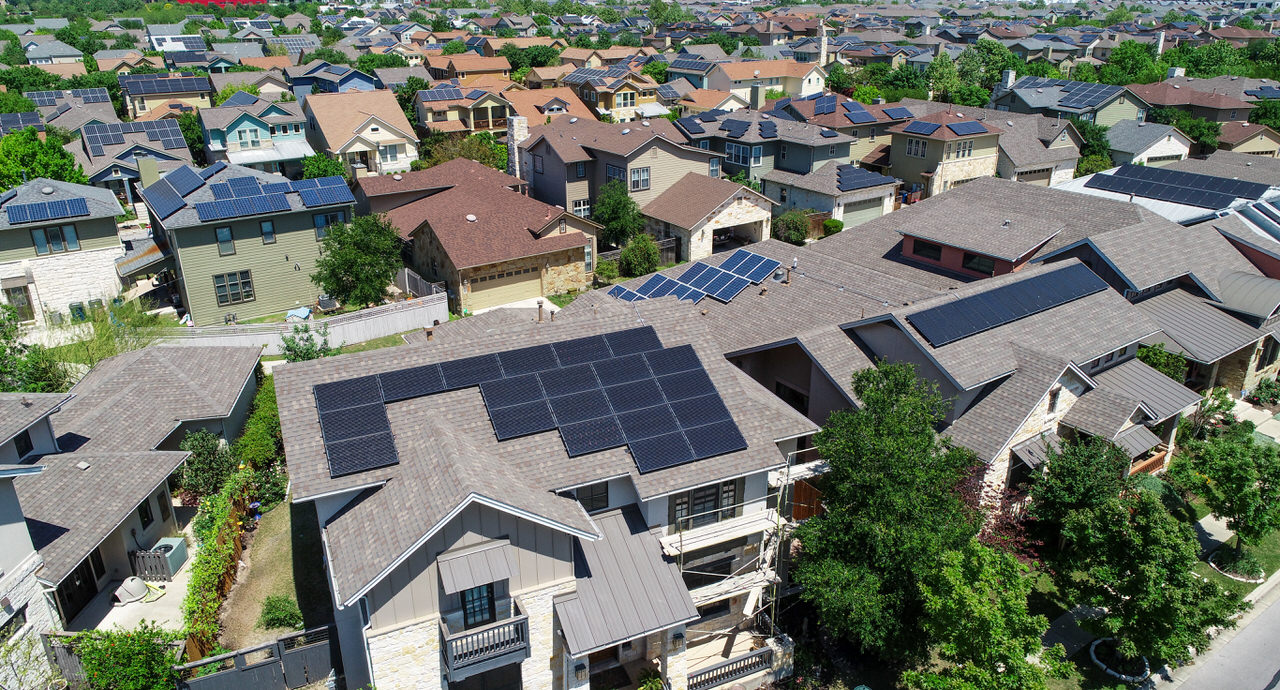Texas is known for its hot and bright summers, so it’s no surprise that solar power is growing increasingly popular in our great state.
As a homeowner, you may be thinking about installing solar panels on your property. You’ve heard about the benefits of solar, but what about the drawbacks?
In this guide, you’ll learn about the pros and cons of switching to solar power in Texas. Use this information to determine if choosing solar is the best choice for your home.
Pro: Significant savings on your power bill
This is the best and most well-known benefit of using solar power.
When you install solar panels on your roof or in your yard, they will use sunlight to generate energy. Since you are getting power from the solar panels, you will need less power from your electrical company. This helps you save money on electricity, often significantly.
Depending on your solar panel system, you may be able to store excess energy for use at night or on cloudy days. If not, you’ll still get all the power you need from your power company. You may just pay a bit more during the winter.
Con: Solar panels are expensive
Solar panels do offer monthly savings, but switching to this type of energy is a major financial investment. The average solar panel system can cost around $15,000. Homes that need more panels or require complex installs may even cost more.
Before choosing solar, make sure you can afford this cost. You can finance your solar panel system, but you should make sure you’re able to take on the debt and additional interest payments.
Shop around before choosing a solar panel company so you can find the best deal.
Pro: Improve your home value
Solar panels provide years of energy savings. For homebuyers, that’s a significant benefit. They may be willing to pay more for the value they’ll see over time.
In fact, every $1 in power savings can increase your home’s value by $20, according to the National Renewable Energy Laboratory. With just $100 in annual energy savings, you can potentially make $2,000 more on your home’s sale.
Solar panels may also be the reason a buyer chooses your home over another. You’ll spend less time on the market, helping you move to your next home faster.
Con: Long-term ROI
As mentioned, solar panels have a high cost. Even with maximum savings on your energy bill, it will take several years to recoup the money you spent on the system.
The average payback time, for example, is about 12 years. If you plan to stay in your home for that period of time, the investment can bring long-term savings.
Homeowners that move before this payback period ends, however, won’t see the same return on their investment, even with a higher home value. Instead, the new homeowners will enjoy the benefits while you’re stuck with the costs.
Pro: Access incentive program benefits
The United States is moving rapidly toward greener forms of energy. To encourage widespread use, federal and local governments are offering financial incentives to homeowners who install solar panels.
The federal solar tax credit in 2022, for instance, is available to anyone who installs a solar panel system this year. They can receive a credit that is equal to 26% of the cost to install the solar panels.
Though Texas doesn’t have statewide incentives yet, you may be able to qualify for a property tax exemption. You should also research local incentive programs to see if you can access rebates or credits in your area.
Con: Solar doesn’t work for every home
Solar panels can only create power if they get enough sunlight. Texas gets more sunlight than most states, but that doesn’t mean that your home is a good fit for a solar panel system.
If your home is in the shade, for example, a solar panel system probably isn’t worth the cost. The design of your home and the direction it faces may also be a problem. Some homeowners may choose to install the panels in their yards instead, but that might not be an option for everyone.
Use tools such as Google’s Project Sunroof or schedule a solar panel consultation to see if solar is right for you.
Pro: Enjoy greener, more independent energy
Homeowners often switch to solar because it’s a cleaner, more sustainable form of energy. Rather than relying on fossil fuels, you can decrease your carbon footprint with this green alternative.
But that’s not the only reason to switch.
Installing a solar panel system decreases your dependence on the power grid. This means that you won’t be affected as much by power outages. You can also limit the impact of rising power costs.
Plus, if you want to get off the grid, solar panels are a great way to produce your own energy. You can enjoy your energy independence and feel better about how your power is made.
Con: Be more vulnerable to weather events
You might be less reliant on the power grid, but you will still need sunlight to power your home. This isn’t a major problem in Texas, but it’s definitely something to consider before installing a solar panel system.
During days with high cloud cover and less sunlight, your system won’t be able to produce as much energy. It also won’t generate energy at night. You can still get energy from your power company, but you won’t see a high ROI on your solar panels during these conditions.
Additionally, storing excess energy can be difficult. Even if your system creates more power than you need, you won’t be able to use it during low-energy hours unless you install a battery.
Hurricanes, tornadoes, hailstorms, and other extreme weather events can damage your solar panels as well. You will then have to cover the repair and/or replacement costs to get your system up and running again.
Learn more about energy options and costs on our blog.

